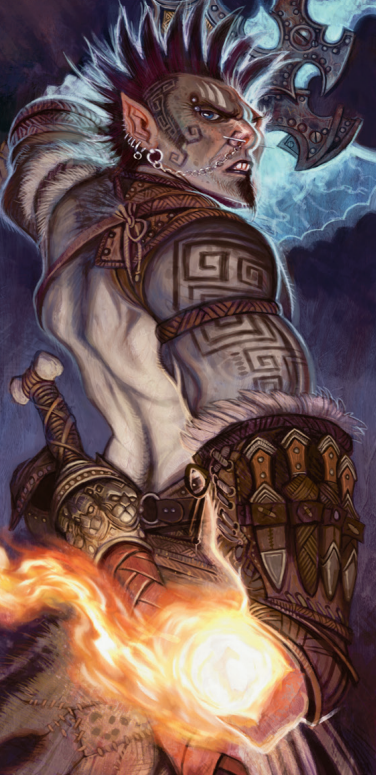Here is dungeon two, session one for Planetary Convulsionary Evolutionary D&D 4e.
In terms of emotional and creative investment, this session was intense. In terms of procedure and ‘labor,’ it was easy — we’ve climbed the first, steep slope of 4e’s learning curve, and from the word go you can see all three of us embrace 4e’s way of doing things, so that the rules are something we use, sharpen, and honor, not follow.
On the topic of emergent theme, I think it’s fair to say that all three of us are compelled by abjection — willing to witness our characters at maximum vulnerability, and take that vulnerability (degradation, even) as seriously as we do their magical and martial might. Sam paid himself, David and me the highest compliment when he said, “We just made real fantasy.” I think that their roleplaying of Al’dread and Shal’houb as profoundly, even frighteningly porous to the events of play in this session is an important element of that.


4 responses to “Refusing the Dream”
Ecstasy and aesthetics? Why, yes please
I'm reminded of how many Fafhrd & Mouser stories concern one or the other succumbing to some pyschological-magic blandishment or influence, always with very strong ideological or religious content, and the other basically dragging him unwillingly out of it.
The session provides a good opportunity to compare the concept/practice of reincorporation with the dysfunctional failure thereof, consensual storytelling.
Reincorporation takes something which is establishd and interacts with it, building upon it. Critically, the contributors have different roles toward the thing, as it continues to be played, and neither can override one another's roles (or responsibilities, authorities, whatever you want to call it). Regardless of who made the thing up or when it was made up, these roles are known and complementary during play.
I'm not going to bother going into consensual storytelling in detail. Briefly, it doesn't do what I just described, because every bit of content is subject to negotiation as well as to elimination via ignoring it. In my terms, there's no control-free authority, just ever-shifting degrees of control, and the outcome is either a mosh-pit (in the bad way) or an eventual takeover.
The difference gives rise to two completely different meanings to continuity:
I’m reminded of how many
This had not occurred to me! This Dungeon also reminded me of how some of the Fafhrd & Grey Mouser stories (I'm thinking of "Lean Times in Lankhmar," "When the Sea-King's Away," "The Jewels in the Forest," and "The Seven Black Priests") conclude with the protagonists surviving whatever mythical-magical peril they've bumped into while still lacking definitive understanding of the overall situation.
Having participated in both of these activities, I have experienced #2 as exhausting and dispiriting, a constant labor to make things happen at all. #1, in comparison, is easy and rewarding, because "what happens" (the outcome of what we just did) is constantly providing dynamic material for "what happens next."
Another dungeon…
…another brutal conclusion. Check out session 5 of Planetary Convulsionary Evolutionary 4e here on YouTube.
I truly love the Avenger.
I truly love the Avenger. First level includes an ability to hurt two foes at range, because why? Because you're a nutbar, that's why.